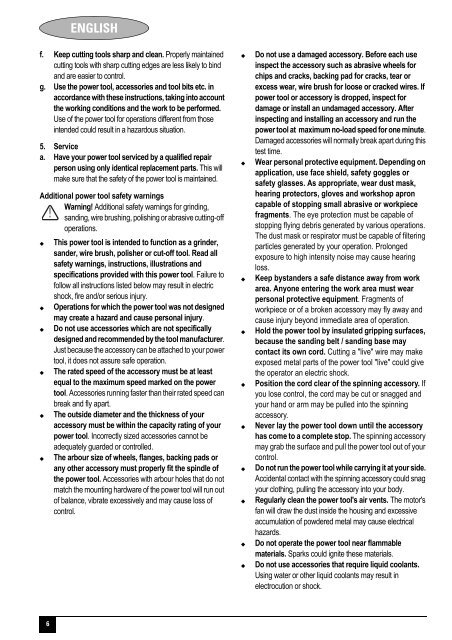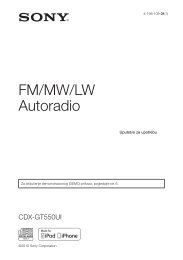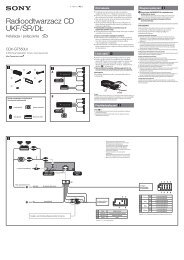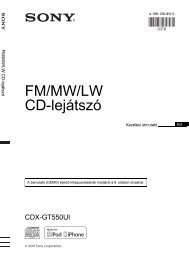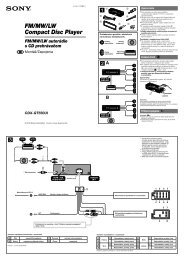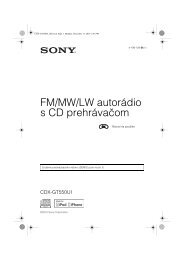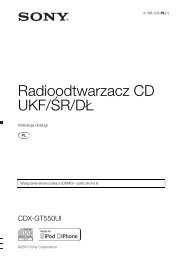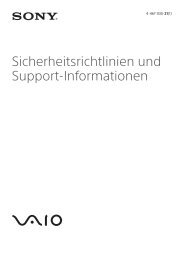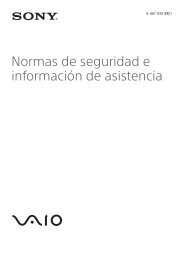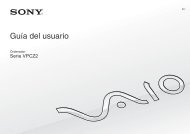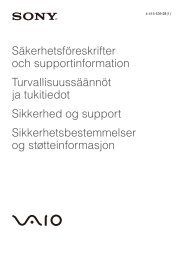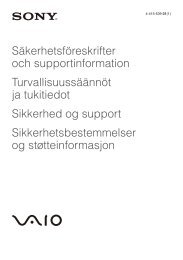BlackandDecker Smerigliatrice Angolare Piccola- Kg900 - Type 2 - Instruction Manual (Europeo)
BlackandDecker Smerigliatrice Angolare Piccola- Kg900 - Type 2 - Instruction Manual (Europeo)
BlackandDecker Smerigliatrice Angolare Piccola- Kg900 - Type 2 - Instruction Manual (Europeo)
Create successful ePaper yourself
Turn your PDF publications into a flip-book with our unique Google optimized e-Paper software.
ENGLISH<br />
f. Keep cutting tools sharp and clean. Properly maintained<br />
cutting tools with sharp cutting edges are less likely to bind<br />
and are easier to control.<br />
g. Use the power tool, accessories and tool bits etc. in<br />
accordance with these instructions, taking into account<br />
the working conditions and the work to be performed.<br />
Use of the power tool for operations different from those<br />
intended could result in a hazardous situation.<br />
5. Service<br />
a. Have your power tool serviced by a qualified repair<br />
person using only identical replacement parts. This will<br />
make sure that the safety of the power tool is maintained.<br />
Additional power tool safety warnings<br />
Warning! Additional safety warnings for grinding,<br />
! sanding, wire brushing, polishing or abrasive cutting-off<br />
operations.<br />
This power tool is intended to function as a grinder,<br />
sander, wire brush, polisher or cut-off tool. Read all<br />
safety warnings, instructions, illustrations and<br />
specifications provided with this power tool. Failure to<br />
follow all instructions listed below may result in electric<br />
shock, fire and/or serious injury.<br />
Operations for which the power tool was not designed<br />
may create a hazard and cause personal injury.<br />
Do not use accessories which are not specifically<br />
designed and recommended by the tool manufacturer.<br />
Just because the accessory can be attached to your power<br />
tool, it does not assure safe operation.<br />
The rated speed of the accessory must be at least<br />
equal to the maximum speed marked on the power<br />
tool. Accessories running faster than their rated speed can<br />
break and fly apart.<br />
The outside diameter and the thickness of your<br />
accessory must be within the capacity rating of your<br />
power tool. Incorrectly sized accessories cannot be<br />
adequately guarded or controlled.<br />
The arbour size of wheels, flanges, backing pads or<br />
any other accessory must properly fit the spindle of<br />
the power tool. Accessories with arbour holes that do not<br />
match the mounting hardware of the power tool will run out<br />
of balance, vibrate excessively and may cause loss of<br />
control.<br />
<br />
<br />
<br />
<br />
<br />
<br />
<br />
<br />
<br />
<br />
Do not use a damaged accessory. Before each use<br />
inspect the accessory such as abrasive wheels for<br />
chips and cracks, backing pad for cracks, tear or<br />
excess wear, wire brush for loose or cracked wires. If<br />
power tool or accessory is dropped, inspect for<br />
damage or install an undamaged accessory. After<br />
inspecting and installing an accessory and run the<br />
power tool at maximum no-load speed for one minute.<br />
Damaged accessories will normally break apart during this<br />
test time.<br />
Wear personal protective equipment. Depending on<br />
application, use face shield, safety goggles or<br />
safety glasses. As appropriate, wear dust mask,<br />
hearing protectors, gloves and workshop apron<br />
capable of stopping small abrasive or workpiece<br />
fragments. The eye protection must be capable of<br />
stopping flying debris generated by various operations.<br />
The dust mask or respirator must be capable of filtering<br />
particles generated by your operation. Prolonged<br />
exposure to high intensity noise may cause hearing<br />
loss.<br />
Keep bystanders a safe distance away from work<br />
area. Anyone entering the work area must wear<br />
personal protective equipment. Fragments of<br />
workpiece or of a broken accessory may fly away and<br />
cause injury beyond immediate area of operation.<br />
Hold the power tool by insulated gripping surfaces,<br />
because the sanding belt / sanding base may<br />
contact its own cord. Cutting a "live" wire may make<br />
exposed metal parts of the power tool "live" could give<br />
the operator an electric shock.<br />
Position the cord clear of the spinning accessory. If<br />
you lose control, the cord may be cut or snagged and<br />
your hand or arm may be pulled into the spinning<br />
accessory.<br />
Never lay the power tool down until the accessory<br />
has come to a complete stop. The spinning accessory<br />
may grab the surface and pull the power tool out of your<br />
control.<br />
Do not run the power tool while carrying it at your side.<br />
Accidental contact with the spinning accessory could snag<br />
your clothing, pulling the accessory into your body.<br />
Regularly clean the power tool's air vents. The motor's<br />
fan will draw the dust inside the housing and excessive<br />
accumulation of powdered metal may cause electrical<br />
hazards.<br />
Do not operate the power tool near flammable<br />
materials. Sparks could ignite these materials.<br />
Do not use accessories that require liquid coolants.<br />
Using water or other liquid coolants may result in<br />
electrocution or shock.<br />
6


